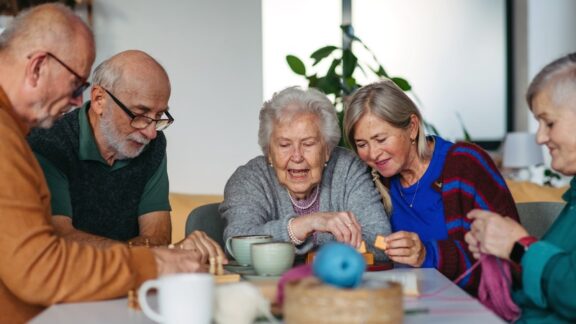When an aging adult begins to need support at home, they may be hesitant to ask for help – or they may not even realize the need. Gretchen McKay talks to experts about how to know when your aging loved one needs home care, whether from a family caregiver or professionals.
PITTSBURGH — Like so many Pittsburgh seniors who’ve lived independently for decades, Kathleen Ward was determined to remain in her Emsworth, Pennsylvania, home after her husband of nearly 60 years, Thomas, died in 2013.
An active senior who still got her hair done and did her own laundry and grocery shopping, “Her big thing was, ‘I’m fine, I’m strong,’“ recalls her daughter Margaret Robbibaro. “She was going to motor on.”
Yet over the next few months, the Sewickley resident started to notice things weren’t quite right with her 84-year-old mother.
She was sleeping more than usual and, at times, just seemed kind of lost in her days. Bills were also occasionally being returned because Ward — a homemaker and mother of six who had always been so meticulous about balancing her checkbook — had already paid them. And Robbibaro started noticing little bruises on her mom’s crepe-like skin, tell-tale signs she was having falls or problems with mobility.
The biggest red flag came in 2014, when Ward fell and broke her wrist while talking on the phone, sending her not just to the hospital but also to rehab for 10 days.
“She hadn’t been eating,” Robbibaro said. Obviously, her living situation had to change.
Knowing when your aging loved one needs support to stay in their home can be difficult for family members to determine. The typical signs of aging are so variable, and many seniors are notoriously independent and therefore reluctant — or embarrassed — to admit they need help with meals, finances and other household responsibilities.
Not only is it hard to relinquish the role of “parent,” but it’s scary when people get older and realize things happen to them physically and emotionally that are out of their control, says Richard Morycz, associate professor of psychiatry, medicine and social work at the University of Pittsburgh. “It can make them become even more stubborn or rigid because they’re used to being in charge and deny the problem.”
It can be even more complicated if you’re caring for an aging parent or relative from a distance, and can’t observe behavioral or functional changes like poor hygiene or difficulty walking, which can be signs of dementia.
In Robbibaro’s case, there was no doubt. Given her mother’s frail state, she knew she would keep falling “and that wasn’t healthy for her.” Robbibaro also knew she would not thrive in a nursing home. So after talking with her siblings, she and husband, Bruce, took Ward into their Sewickley home and, with their assistance, took care of her until her death last year at age 93.
“Once she was with us, there were eyes on her and people around, and she really improved,” Robbibaro says.
Common indicators when a senior needs home care
Maybe you’re wondering about your aging parent’s situation at home, whether he or she needs home care, and whether you should be taking a more active role in their daily home life. Experts say there are some common signs that indicate when it could be time to step in.

“I always bring it back to the basics of daily living, such as bathing, eating and walking, “ says Lyn Weinberg, a geriatrician and director of the division of geriatrics for the AHN Primary Care Institute. “When people are having decline in any one of those areas, you know they are at risk for something bad happening.”
To that end, changes in the home environment are often a first clue your senior may need assistance, says Morycz. Is someone who has always been able to cook, do laundry and pay their bills suddenly bouncing checks or making late payments and not changing their clothes? Is a house that used to be pristine now messy and dirty, with stacks of unopened mail or spoiled food on the counter?
Neglecting household tasks is a familiar sign of decline, so it’s important to observe even small changes around the house. And by “observing,” Morycz means not just taking your parents’ word that everything is fine, but being there and seeing how they are actually functioning on a day-to-day basis.
“If the thought is, ‘that doesn’t sound like mom or dad,’ that could be a warning sign to seek help,” he says.
Changes in normal behavior is another indicator — for instance, if the mom who has always been so sweet and pleasant is now critical or suspicious, or a loving couple is suddenly irritated or annoyed with one another — “that is a major observation and a reason to think that someone might need to get more help,” says Morycz.
One of the first things that made Patricia Blessitt of Braddock realize her mother, Jacqueline, now 95, was having problems at home was when she began hoarding toilet paper. She also started accusing her nephew of taking money from her and refused to go on a family cruise because she had an irrational fear of being arrested.
“It was terrible,” Blessitt recalls. “I cried day and night.” Eventually diagnosed with dementia, her mother ended up moving in with her in 2008 so she could be safely cared for.
Learn more about home care options, right here at Seniors Guide
While the loss of friends and spouses that are inevitable with normal aging causes sadness, signs of depression such as changes in sleep and a loss of interest in activities or hobbies are also red flags. And you want to keep an eye out for forgetfulness or difficulty with problem-solving that affect your loved one’s day-to-day abilities, which could be a sign of early dementia.
In general our memory changes as we get older, says Sara Murphy, vice president of programs and services at the Alzheimer’s Association Greater Pittsburgh Chapter; just because you’re old and forget something doesn’t mean you’re on the path to dementia.
But if memory loss is impacting someone’s life on a consistent basis — say, forgetting where their bank is or missing doctors’ appointments — that’s concerning.
Difficulty in holding a conversation could be another sign of early dementia, the umbrella term for any severe decline in mental abilities due to the brain’s physical deterioration, of which Alzheimer’s Disease is the most common form.
Keep in mind, though, that issues like dehydration, medication interactions, UTIs and nutrition deficiencies can cause memory lapses, confusion or poor judgment, mirroring dementia. “So it’s really important to get a cognitive screening” of your loved one to distinguish between what’s normal and what’s not.
Know, too, that because an aging senior might be the first one to notice changes, they might cover up by withdrawing from social activities, making excuses for weird behavior or lying when confronted that something’s wrong.
Show concern, not criticism
The best way to be prepared to help aging loved ones, of course, is to have routine, scheduled contact with them before you step in as a caregiver. That way, they expect the daily phone calls or weekly visits, and it becomes routine instead of suspicious. It’s also easier to observe changes that indicate someone needs home care when you’re familiar with the routine, says Morycz.

Being involved as a partner in their health care allows them to understand you’re not trying to take control away but rather are concerned about their well-being and want to know what’s going on so they can safely stay at home.
“The hope is, you get them to accept you as someone who needs to help them, so as problems become worse, you’re already the helper,” he says.
It also helps an adult child’s expectations as a caregiver become realistic because they’re not working on stereotypes, he says.
Also, it’s essential to treat your aging loved one with courtesy and compassion instead of being commanding or critical, says Morycz.
Rather than tell them you’re going to the doctor with them, for instance, ask “When is your next visit and do you mind if I go with you?”
“Sometimes the gentle way is the better way,” he says.
“There’s a vulnerability about letting someone come into your home,” agrees Cindy Vunovich, Allegheny Health Network’s vice president of clinical integration and performance. “Once someone allows that to happen, it should be very respectful.”
Read more articles for caregivers here on Seniors Guide
©2023 the Pittsburgh Post-Gazette
Visit the Pittsburgh Post-Gazette at www.post-gazette.com
Distributed by Tribune Content Agency, LLC.




